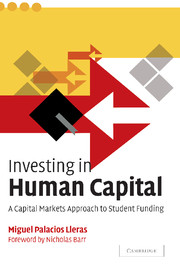Book contents
- Frontmatter
- Contents
- List of figures
- List of tables
- Foreword
- Acknowledgments
- Introduction
- Part I The problem of financing education
- Part II Equity-like investments to finance education
- Part III Implementing human capital contracts
- 8 Hurdles in the implementation of human capital contracts
- 9 Lessons from the implementation of income-contingent loans
- 10 Government-driven implementation of human capital contracts
- 11 Conclusion
- Appendix A Valuation of human capital contracts
- Appendix B Using human capital options to value income-contingent loans
- Appendix C Features of human capital contracts, income-contingent loans, and traditional mortgage-type loans
- Appendix D A developing country study
- Notes
- References
- Index
11 - Conclusion
Published online by Cambridge University Press: 08 January 2010
- Frontmatter
- Contents
- List of figures
- List of tables
- Foreword
- Acknowledgments
- Introduction
- Part I The problem of financing education
- Part II Equity-like investments to finance education
- Part III Implementing human capital contracts
- 8 Hurdles in the implementation of human capital contracts
- 9 Lessons from the implementation of income-contingent loans
- 10 Government-driven implementation of human capital contracts
- 11 Conclusion
- Appendix A Valuation of human capital contracts
- Appendix B Using human capital options to value income-contingent loans
- Appendix C Features of human capital contracts, income-contingent loans, and traditional mortgage-type loans
- Appendix D A developing country study
- Notes
- References
- Index
Summary
The capacity that income-contingent repayment schemes (ICRs) have to transform the traditional way in which governments have faced the challenges of financing education are enormous. The advantages that these repayment schemes offer over other alternatives should lead policymakers around the world to implement the legal structures needed for them to exist.
The process has already started with the introduction of income-contingent loans (ICLs) in several countries. But it cannot stop there. A global market where the value of Human Capital can be traded, in different forms, either directly or through derivative securities, is the ultimate development that can enable capital to flow to wherever there is an opportunity to liberate value by investing in education. That should be the aim of education policymakers around the globe. More than fifty years after Friedman proposed the original idea, the challenge now is whether entrepreneurs and political leaders are willing to use the available technology and the financial innovations that have taken place during that period to serve those who want to invest in education.
The big picture
Towards equal access to education
One of the main arguments in favor of human capital contracts (HCCs) and human capital options (HCOs) is that they can be equally accessible to all, independent of their background. In particular, these instruments should have a special appeal to those that display risk averse behavior towards investments in education and also do not have the resources to invest directly.
- Type
- Chapter
- Information
- Investing in Human CapitalA Capital Markets Approach to Student Funding, pp. 162 - 166Publisher: Cambridge University PressPrint publication year: 2004



